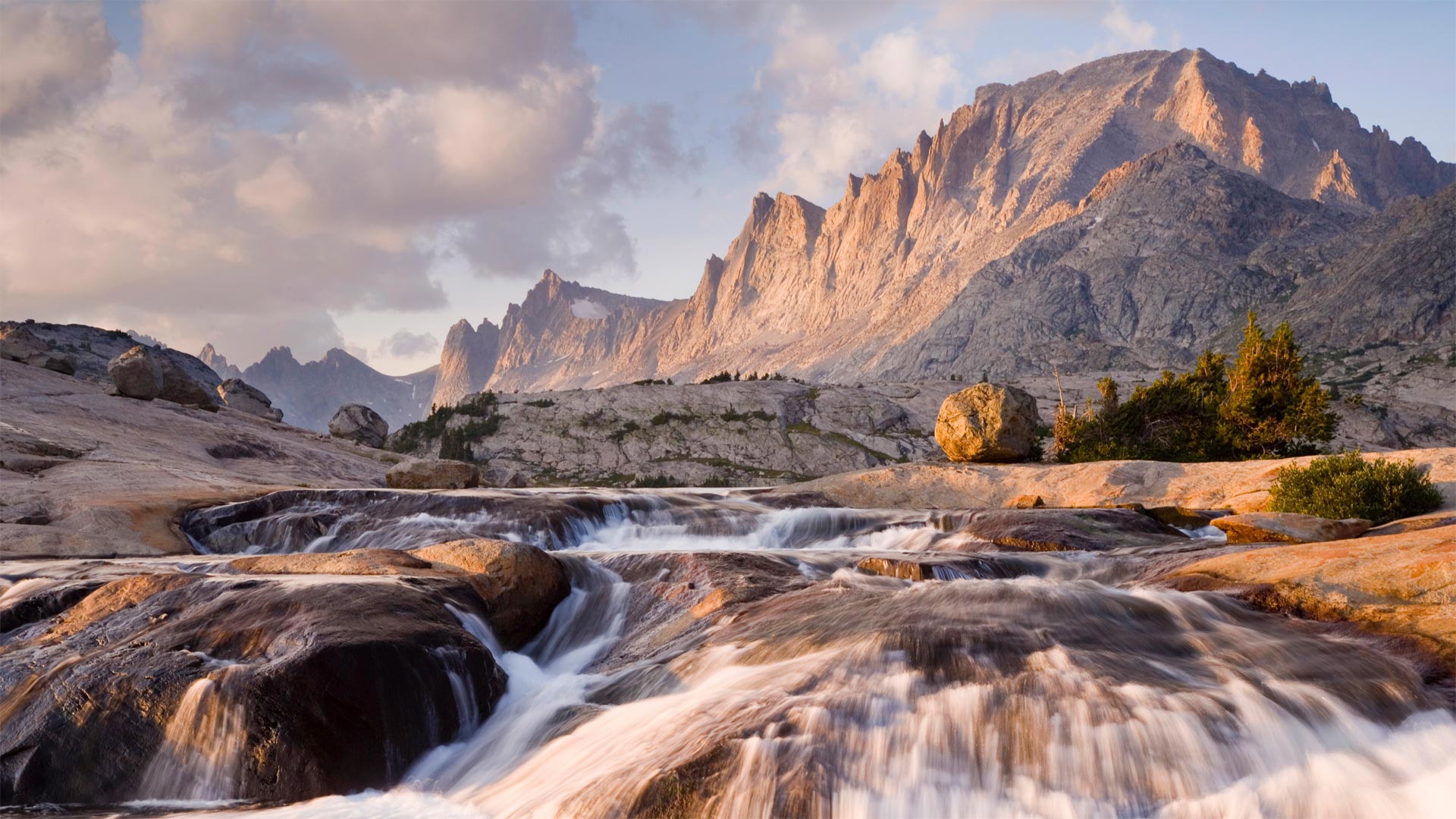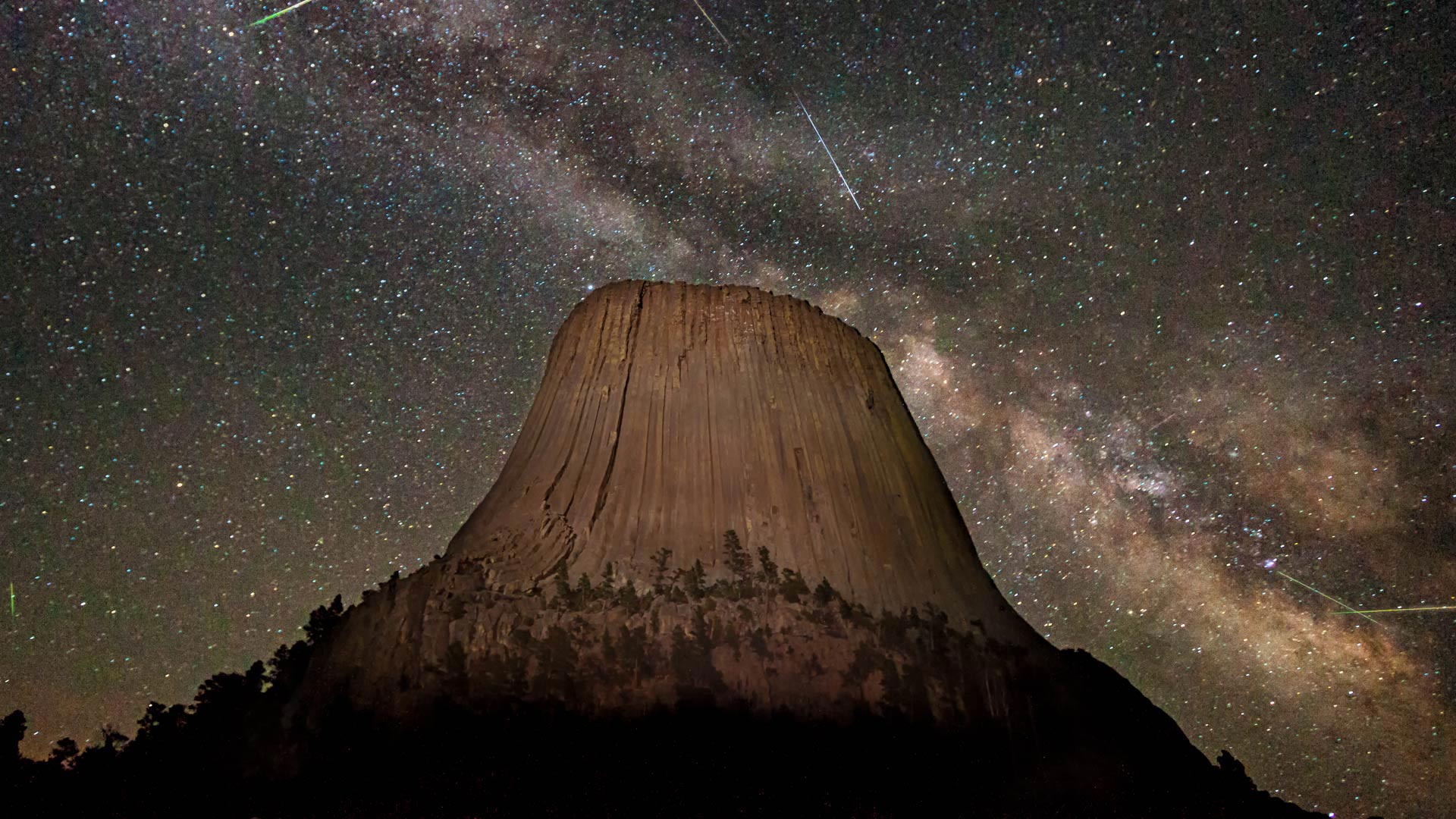黄石国家公园里的上间歇泉盆地,美国怀俄明州 Upper Geyser Basin in Yellowstone National Park, Wyoming (© Ray Urner/Tandem Stills + Motion)
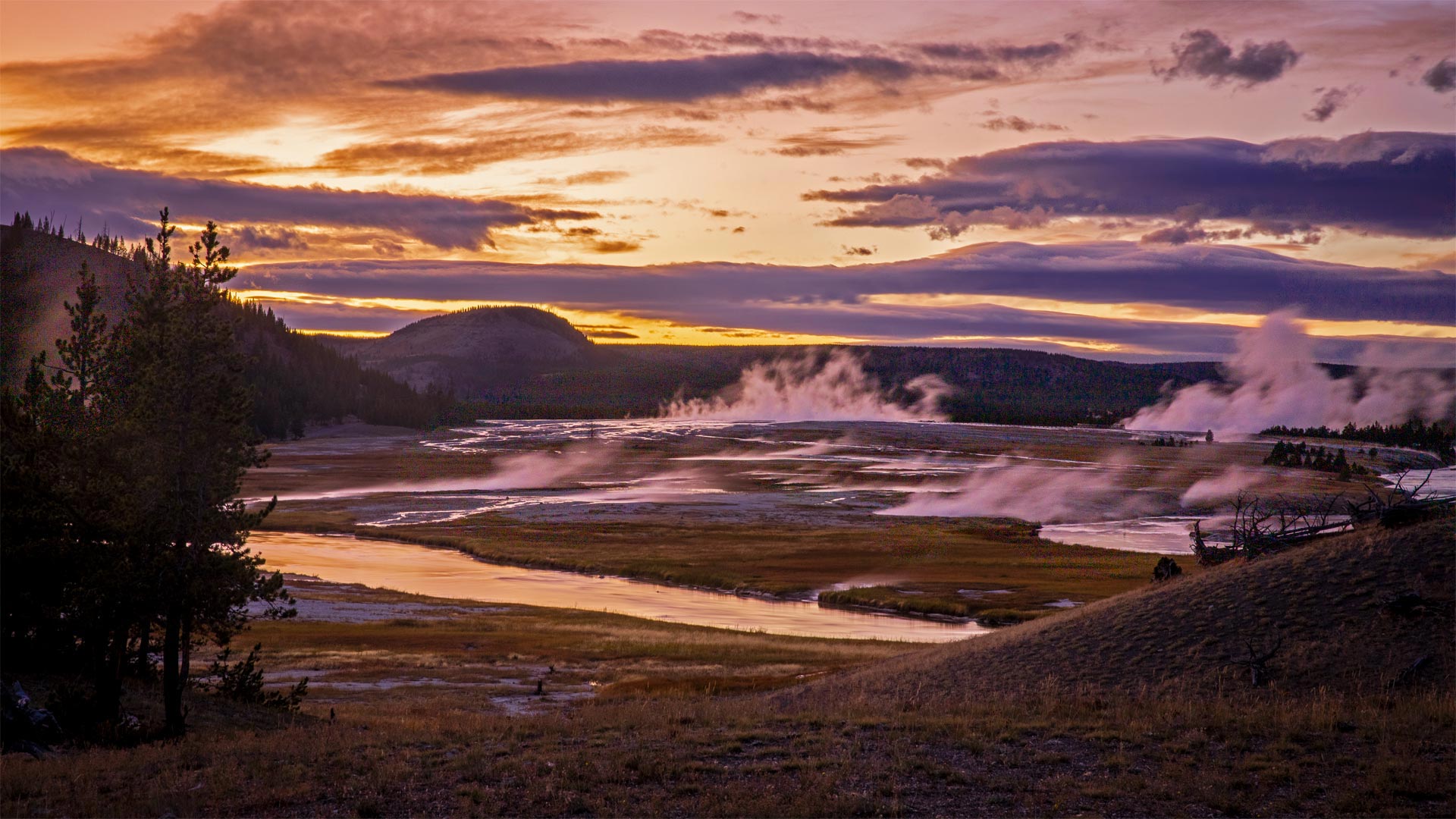
黄石国家公园里的上间歇泉盆地,美国怀俄明州 Upper Geyser Basin in Yellowstone National Park, Wyoming (© Ray Urner/Tandem Stills + Motion)
水与火相遇的地方 Where fire and water meet
Upper Geyser Basin, Yellowstone National Park
The highest concentration of geysers and hydrothermal springs in the world are located here in this corner of Yellowstone National Park, called the Upper Geyser Basin. They include what is perhaps the most famous geyser of them all: Old Faithful. But the Upper Basin contains many other geysers as well, including the tallest predictable geyser (Grand Geyser) and the most voluminous geyser (Giant Geyser). Yellowstone contains about 300 geysers, about two-thirds the number in the entire world.
Geysers are essentially a rare form of hot spring—a water-filled tube that extends thousands of feet into the Earth's crust, so deep it makes contact with molten rock called magma. The water in the tube boils and under extreme pressure ejects the water column into the air, emptying the tube. After some time, more groundwater seeps into the tube, filling it, and starting the process over again. That's why geysers erupt at somewhat regular intervals. The bigger the tube, the more water, and the longer the eruption. Yellowstone is one of the few places in the world where you can safely walk among so many geysers and superheated springs, and view them close up. Trails and boardwalks guide the way, making the Upper Geyser Basin one of the star attractions of this famous national park.
黄石国家公园上间歇泉盆地
世界上最密集的间歇泉和热泉位于黄石国家公园的这个角落,被称为上间歇泉盆地。其中最著名的喷泉可能是:老忠实喷泉。但上盆地也有许多其他间歇泉,包括最高的可预测间歇泉(大间歇泉)和最大的间歇泉(巨型间歇泉)。黄石公园有大约300个间歇泉,大约是全世界的三分之二。
间歇泉本质上是一种罕见的温泉,它是一种充满水的管子,伸入地壳数千英尺深,与称为岩浆的熔融岩石接触。管子中的水沸腾,在极端压力下将水柱喷射到空气中,排空管子。一段时间后,更多的地下水渗入管道,将其充满,然后重新开始这一过程。这就是间歇泉每隔一定时间喷发的原因。管子越大,水越多,喷发时间越长。黄石公园是世界上为数不多的几个可以在众多间歇泉和过热泉水之间安全漫步并近距离观看的地方之一。小径和木板人行道指引着道路,使上间歇泉盆地成为这个著名国家公园的明星景点之一。
黄石国家公园的大棱镜泉鸟瞰图,美国怀俄明州 Aerial view of Grand Prismatic Spring, Yellowstone National Park, Wyoming (© AirPano LLC/Amazing Aerial Agency)
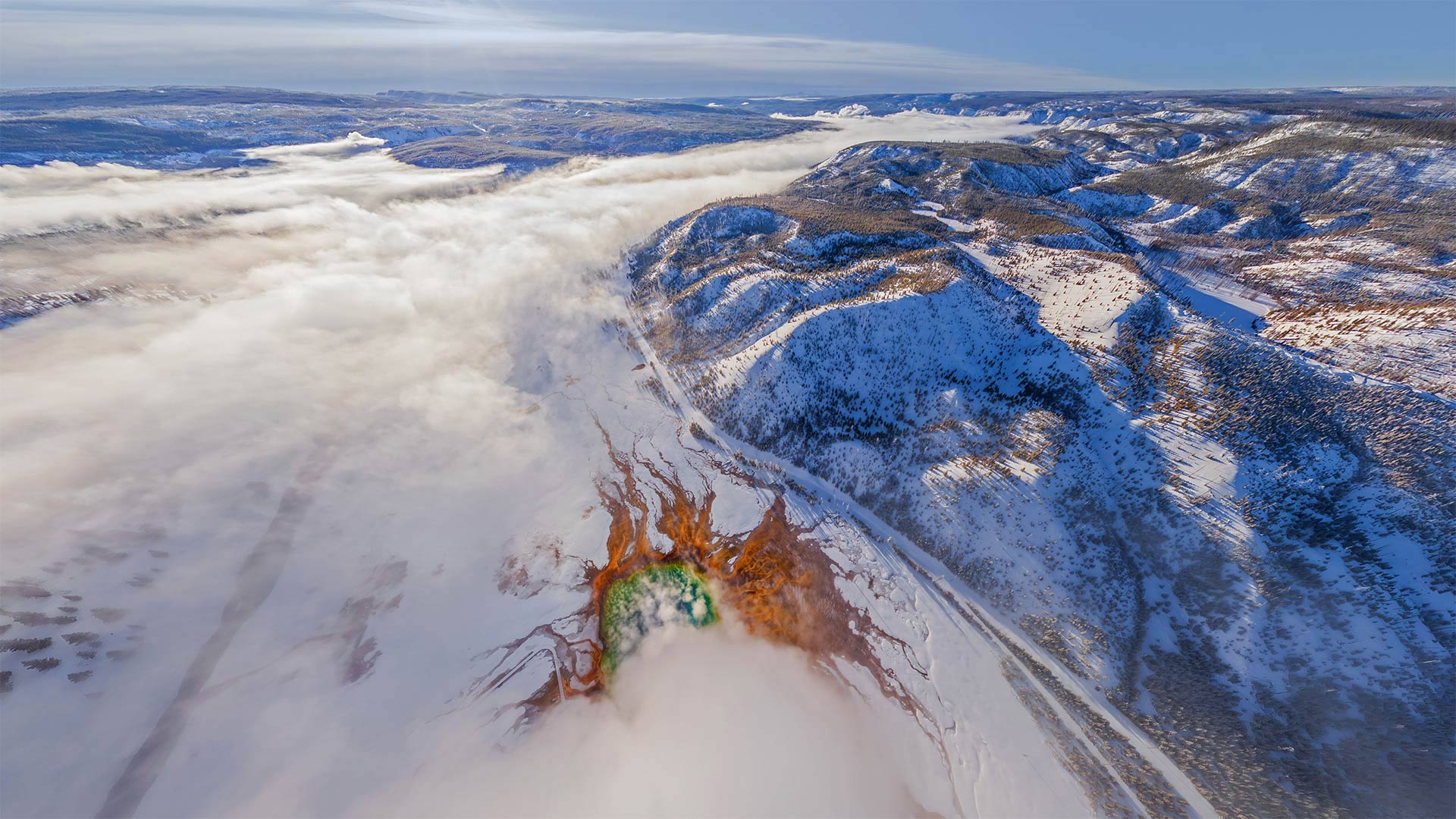
黄石国家公园的大棱镜泉鸟瞰图,美国怀俄明州 Aerial view of Grand Prismatic Spring, Yellowstone National Park, Wyoming (© AirPano LLC/Amazing Aerial Agency)
“美国最好的想法”起源于此 'America's best idea' began here
National Park Week begins
Only a very small percentage of Yellowstone's total visitors see the park when it looks like this. In winter, when the park grows quiet, its hydrothermal features really stand out, like the rainbow-hued Grand Prismatic Spring near the center of this image, the most photographed feature in Yellowstone.
Just the inspiration we need as we start National Park Week, an occasion to celebrate the splendor of our park system and turn to thoughts of hiking, paddling, and camping. The 'Week' is actually a bit longer, starting today and running through Sunday, April 24. Yellowstone was established by congress 150 years ago as the nation's first national park. Today, there are 63, and they include the volcanoes of Hawaii, the giant sequoias of California, the Grand Canyon, and the desolate moonscape of the Badlands.
Perhaps no national park better captures the American landscape than Yellowstone, 3,500 square miles of lakes, canyons, rivers, mountains, waterfalls, hot springs, and its charismatic megafauna—bison, wolves, elk, and grizzly bears. But it's Yellowstone's hydrothermal sites that really set it apart. Old Faithful might be the most famous, but it's only one of 10,000 around here. Although the park is still chilly in April, you'll have the place mostly to yourselves. Only about 44,000 visit Yellowstone in April, compared to the nearly 1 million who gather each July. If you need more incentive, entrance fees today, in honor of National Park Week, are on the house.
国家公园周开始
当黄石公园看起来像这样时,只有很小比例的游客参观了它。在冬天,当公园变得安静时,它的热液特征真的很突出,比如这张图片中心附近彩虹色的大棱柱形泉水,这是黄石公园拍摄最多的特征。
这正是我们开始国家公园周时所需要的灵感。国家公园周是一个庆祝我们公园系统辉煌的时刻,我们可以考虑徒步旅行、划船和露营。“一周”实际上要长一点,从今天开始,一直持续到4月24日周日。黄石公园是美国国会在150年前建立的第一个国家公园。如今,这里有63座火山,其中包括夏威夷的火山、加利福尼亚州的巨大红杉、大峡谷和荒地荒凉的月球景观。
也许没有哪个国家公园能比黄石公园更好地捕捉到美国的风景。黄石公园有3500平方英里的湖泊、峡谷、河流、山脉、瀑布、温泉,以及迷人的大型动物群——野牛、狼、麋鹿和灰熊。但真正让它与众不同的是黄石公园的热液遗址。老忠实可能是最有名的,但它只是这里一万个中的一个。虽然四月份公园里仍然很冷,但你可以独处。4月份只有大约4.4万人参观黄石公园,而每年7月有近100万人聚集在这里。如果你需要更多的奖励,为了纪念国家公园周,今天的入场费是免费的。
驼鹿穿过莫兰山下的池塘,怀俄明州大提顿国家公园 Moose crossing a pond below Mount Moran, Grand Teton National Park, Wyoming (© Jim Stamates/Minden Pictures)
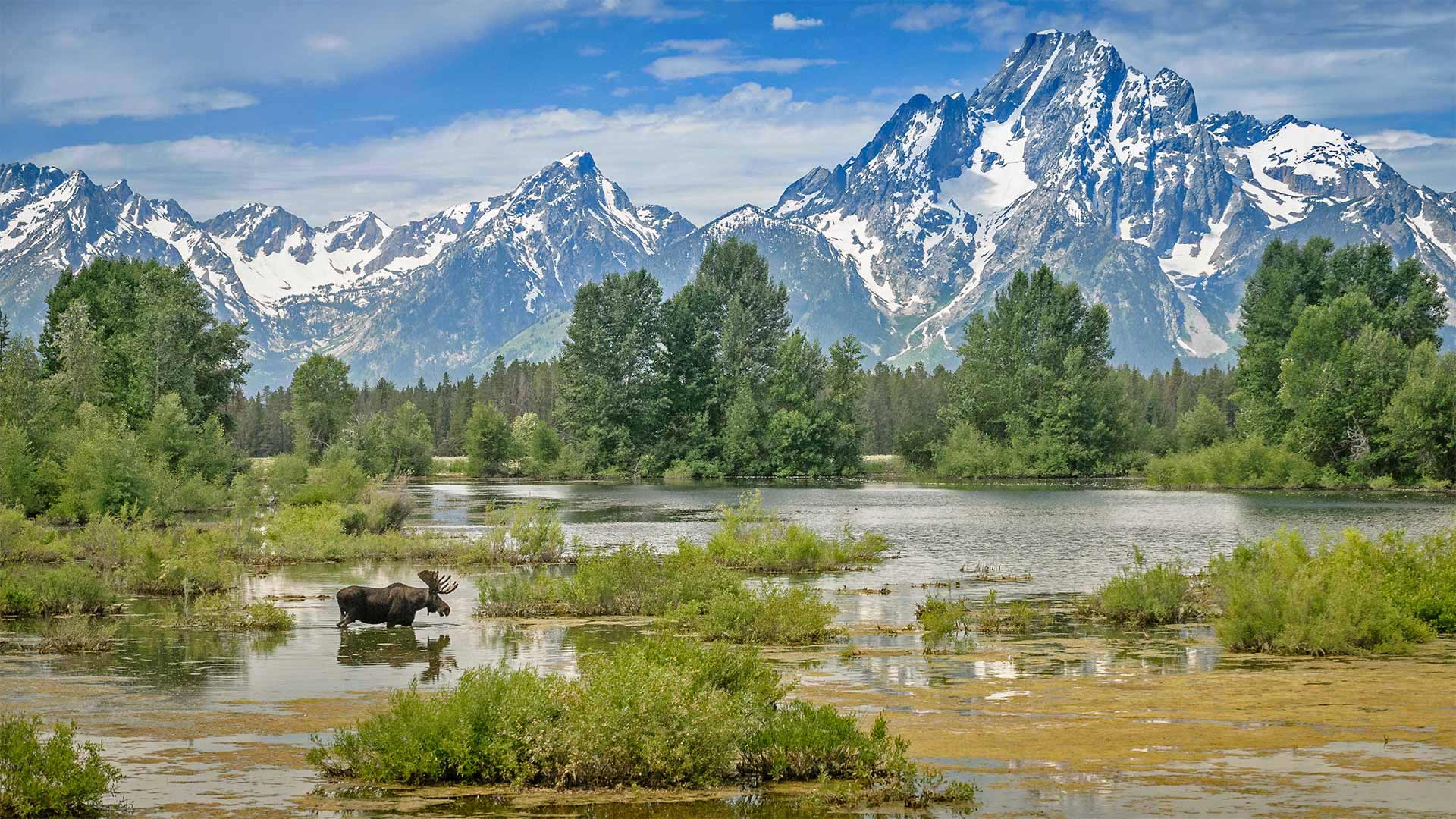
驼鹿穿过莫兰山下的池塘,怀俄明州大提顿国家公园 Moose crossing a pond below Mount Moran, Grand Teton National Park, Wyoming (© Jim Stamates/Minden Pictures)
Through an artist's eyes
If this beautiful view of Grand Teton National Park seems as pretty as a painting, there may be a reason for it. That majestic peak towering over the landscape is Mount Moran, named for Thomas Moran, an American artist of New York's Hudson River School who earned fame by painting scenes of the western frontier. In 1871, Moran and photographer William Henry Jackson were invited on an expedition to the Yellowstone region to accompany a team from the US Geological Society while they conducted the first comprehensive survey of the area. Moran's paintings and Jackson's photographs from the trip immediately captured the public's attention and inspired Congress to establish Yellowstone as the first national park in 1872.
For the next two decades, Moran painted hundreds of landscapes of the Yellowstone region, producing indelible images of this spectacular wilderness that would come to define the American West in the imaginations of many. The area had such an impact on Moran that he adopted the signature T-Y-M, Thomas 'Yellowstone' Moran. He returned to the area in August 1879 on an expedition to the Teton range, just south of Yellowstone National Park. He never made it as far into the mountains as he'd hoped, but gazing up at the towering peaks, he wrote in his diary, 'From this point it is perhaps the finest pictorial range in the United States or even N. America.' Judging from this image, it's hard to argue with him.
透过艺术家的眼睛
如果大提顿国家公园的美景看起来像一幅画一样美丽,那可能是有原因的。这座巍峨的山峰是摩兰山,以纽约哈德逊河学校的美国艺术家托马斯·莫兰的名字命名,他以画西部边疆而闻名。1871年,莫兰和摄影师威廉·亨利·杰克逊应邀到黄石地区探险,陪同美国地质学会的一个小组对该地区进行第一次全面调查。莫兰的画作和杰克逊旅行中的照片立即引起了公众的注意,并在1872年激励国会将黄石公园建成第一个国家公园。
在接下来的20年里,莫兰绘制了黄石地区的数百幅风景画,为这片壮观的荒野绘制了不可磨灭的图像,这些图像将在许多人的想象中成为美国西部的定义。这个地区对莫兰的影响如此之大,以至于他采用了标志性的T-Y-M,托马斯“黄石”莫兰。他于1879年8月返回该地区,前往黄石国家公园以南的提顿山脉探险。他从来没有像他所希望的那样深入山区,但他在日记中写道,仰望巍峨的山峰,从这一点上看,它可能是美国乃至北美最好的画作。从这个形象来看,很难和他争辩。
大提顿国家公园中的野牛,怀俄明州 Bison in Grand Teton National Park, Wyoming (© Brian Evans/Getty Images)
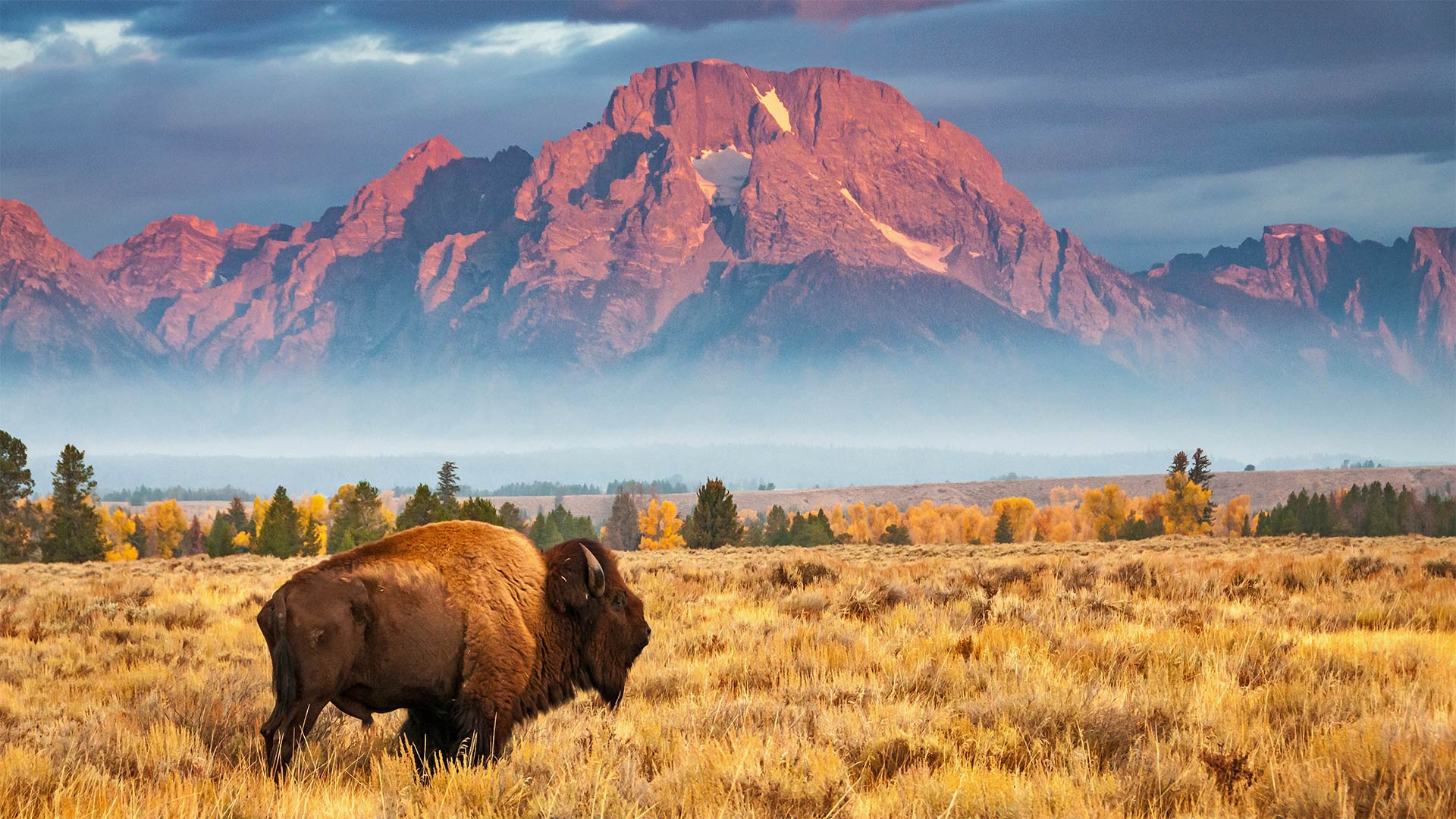
大提顿国家公园中的野牛,怀俄明州 Bison in Grand Teton National Park, Wyoming (© Brian Evans/Getty Images)
National Bison Day
If ever there was an animal that deserved some recognition, it's the bison. Since 2012, National Bison Day has been observed on the first Saturday of November to acknowledge the animal's cultural, historical, and economic significance—as well as its remarkable comeback. Bison were once plentiful in North America. Tens of millions strong in the 1800s, they roamed in great herds, helping to diversify and maintain the prairie habitat. They've also played several important roles in Native American cultures. Indigenous peoples have used every part of the bison for food, utensils, and clothing—and they pay tribute to the giant beasts in religious rituals.
Settlement of the American West caused habitat loss for the bison and that, combined with overhunting, nearly wiped out the species altogether—until ranchers, conservationists, and politicians teamed up to save them. In 1913, 14 bison from the Bronx Zoo were shipped to a wildlife refuge to revive the population. Fast forward to today, and more than 20,000 bison roam on public lands in the United States.
大提顿国家公园中的Old Patriarch Tree,怀俄明州 The Old Patriarch Tree of Grand Teton National Park, Wyoming (© George Sanker/Minden Pictures)
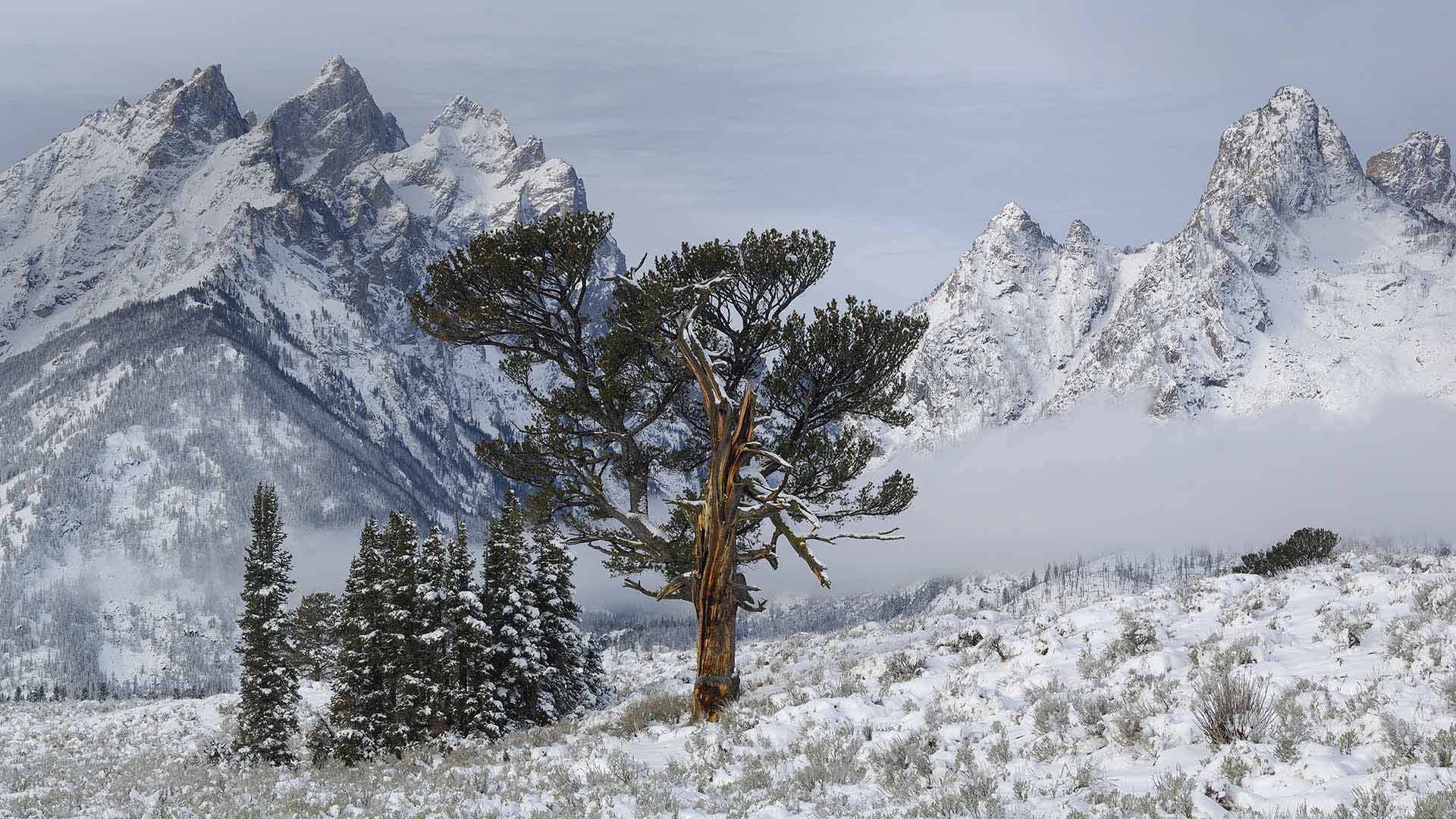
大提顿国家公园中的Old Patriarch Tree,怀俄明州 The Old Patriarch Tree of Grand Teton National Park, Wyoming (© George Sanker/Minden Pictures)
A tree amid the Tetons
This limber pine standing alone in the sage brush flats has a name—Old Patriarch. A favorite subject of nature photographers in Wyoming's Grand Teton National Park, Old Patriarch is thought to be more than a thousand years old. The 'Cathedral Group' of the Teton Mountains forms a breathtaking backdrop, bursting up from the valley floor below and stretching dramatically to the soaring peaks. The national park spreads out below the spires for 310,000 acres, creating a home for extraordinary wildlife, pristine lakes, and alpine terrain. Sounds like the Old Patriarch has found quite a home for himself.
Commonly found in the Rocky Mountains, limber pines are known to stand the test of time—literally. Some people estimate Old Patriarch to be more than a thousand years old. The 'Cathedral Group' of the Teton Mountains forms a breathtaking backdrop, bursting up from the valley floor below and stretching dramatically to the soaring peaks. The national park spreads out below the spires for 310,000 acres, creating a home for extraordinary wildlife, pristine lakes, and alpine terrain. Sounds like the Old Patriarch has found quite a home for himself.
黄石国家公园的大棱镜泉,怀俄明州 The Grand Prismatic Spring in Yellowstone National Park, Wyoming (© Martin Rügner/DEEPOL by plainpicture)
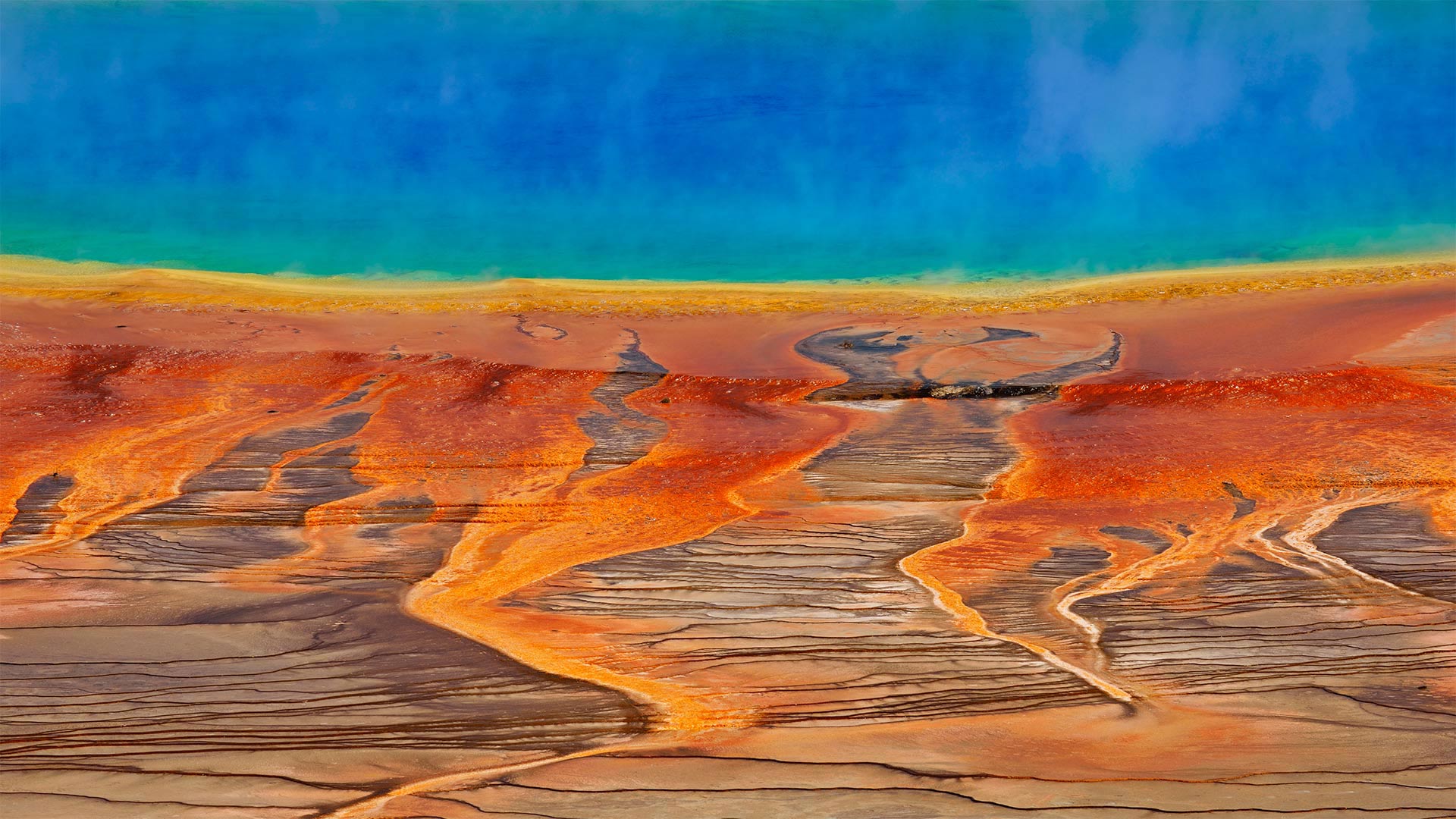
黄石国家公园的大棱镜泉,怀俄明州 The Grand Prismatic Spring in Yellowstone National Park, Wyoming (© Martin Rügner/DEEPOL by plainpicture)
Colors spring up in Yellowstone
As National Park Week continues, we're taking a look at the Grand Prismatic Spring, one of the more popular attractions in Yellowstone National Park. Visitors on an elevated wooden boardwalk come to witness the vivid colors, which are formed due to a cycle of hot water rising, cooling, and falling--creating rings of distinct temperatures inside the spring. The clear, blue center is the hottest part, with almost nothing living in it. But the other rings are home to different organisms that give the water its rings of color. While it's beautiful to look at, you wouldn't want to swim in it. It's illegal, but it's also much too hot—and the sulfur smell wouldn't leave you feeling too clean.
凯利温泉中的黑嘴天鹅,怀俄明州 Trumpeter swans at Kelly Warm Springs, near Kelly, Wyoming (© DEEPOL by plainpicture)
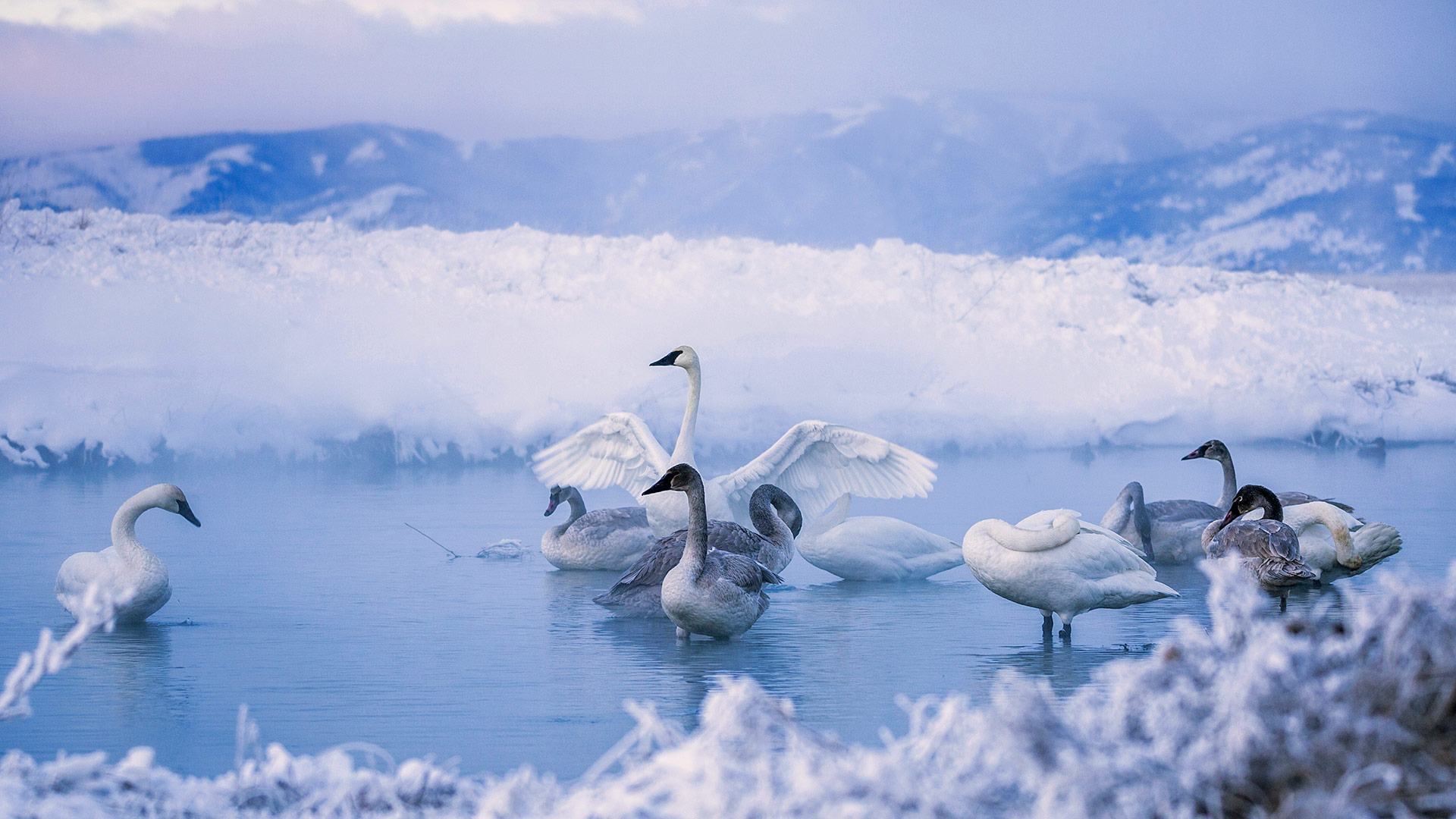
凯利温泉中的黑嘴天鹅,怀俄明州 Trumpeter swans at Kelly Warm Springs, near Kelly, Wyoming (© DEEPOL by plainpicture)
Did they forget to fly south?
Native to North America, trumpeter swans live near rivers, lakes, and coastal byways in northern and western US states in the lower 48, as well as in Canada and Alaska. Depending on where they live, these swans are either resident birds or medium-range migrators. What they all require, though, is open water during winter, since their diet consists almost entirely of aquatic plants. That may be why the swans in this image are drawn to the waters of Kelly Warm Springs in Wyoming, which won't freeze even as snow lines the banks.
Trumpeters are the largest living species of waterfowl in North America. The biggest known cob—that's a male swan--weighed almost 40 pounds and had a wingspan of 10 feet. Although in the early 20th century they came perilously close to extinction, today there's an estimated 35,000 trumpeters. Even with the tremendous recovery, it remains illegal to hunt them. And yes, their calls do sound like trumpets, but Miles Davis they aren't. Click below to listen.
